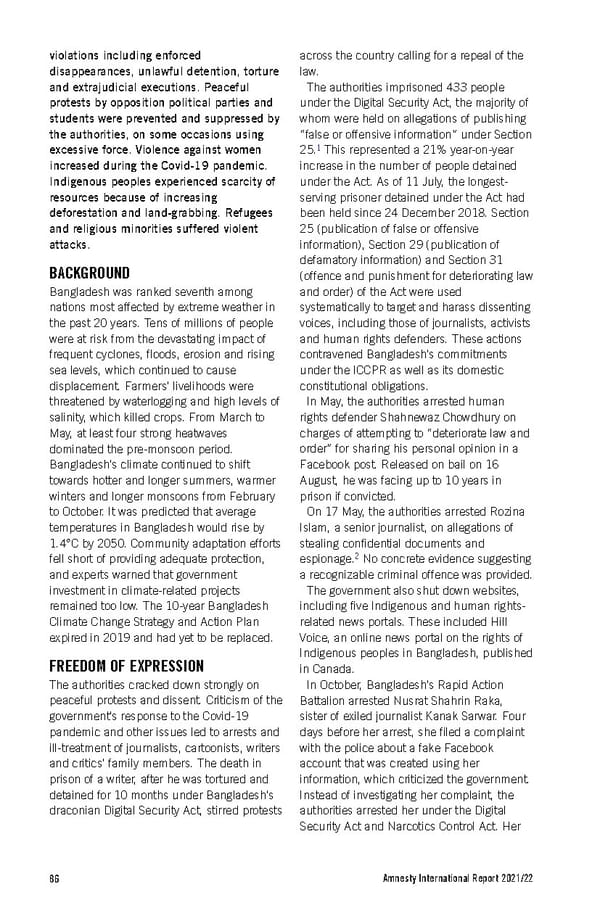violations including enforced across the country calling for a repeal of the disappearances, unlawful detention, torture law. and extrajudicial executions. Peaceful The authorities imprisoned 433 people protests by opposition political parties and under the Digital Security Act, the majority of students were prevented and suppressed by whom were held on allegations of publishing the authorities, on some occasions using “false or offensive information” under Section excessive force. Violence against women 25.1 This represented a 21% year-on-year increased during the Covid-19 pandemic. increase in the number of people detained Indigenous peoples experienced scarcity of under the Act. As of 11 July, the longest- resources because of increasing serving prisoner detained under the Act had deforestation and land-grabbing. Refugees been held since 24 December 2018. Section and religious minorities suffered violent 25 (publication of false or offensive attacks. information), Section 29 (publication of BACKGROUND defamatory information) and Section 31 (offence and punishment for deteriorating law Bangladesh was ranked seventh among and order) of the Act were used nations most affected by extreme weather in systematically to target and harass dissenting the past 20 years. Tens of millions of people voices, including those of journalists, activists were at risk from the devastating impact of and human rights defenders. These actions frequent cyclones, floods, erosion and rising contravened Bangladesh’s commitments sea levels, which continued to cause under the ICCPR as well as its domestic displacement. Farmers’ livelihoods were constitutional obligations. threatened by waterlogging and high levels of In May, the authorities arrested human salinity, which killed crops. From March to rights defender Shahnewaz Chowdhury on May, at least four strong heatwaves charges of attempting to “deteriorate law and dominated the pre-monsoon period. order” for sharing his personal opinion in a Bangladesh’s climate continued to shift Facebook post. Released on bail on 16 towards hotter and longer summers, warmer August, he was facing up to 10 years in winters and longer monsoons from February prison if convicted. to October. It was predicted that average On 17 May, the authorities arrested Rozina temperatures in Bangladesh would rise by Islam, a senior journalist, on allegations of 1.4°C by 2050. Community adaptation efforts stealing confidential documents and fell short of providing adequate protection, espionage.2 No concrete evidence suggesting and experts warned that government a recognizable criminal offence was provided. investment in climate-related projects The government also shut down websites, remained too low. The 10-year Bangladesh including five Indigenous and human rights- Climate Change Strategy and Action Plan related news portals. These included Hill expired in 2019 and had yet to be replaced. Voice, an online news portal on the rights of FREEDOM OF EXPRESSION Indigenous peoples in Bangladesh, published in Canada. The authorities cracked down strongly on In October, Bangladesh’s Rapid Action peaceful protests and dissent. Criticism of the Battalion arrested Nusrat Shahrin Raka, government’s response to the Covid-19 sister of exiled journalist Kanak Sarwar. Four pandemic and other issues led to arrests and days before her arrest, she filed a complaint ill-treatment of journalists, cartoonists, writers with the police about a fake Facebook and critics’ family members. The death in account that was created using her prison of a writer, after he was tortured and information, which criticized the government. detained for 10 months under Bangladesh’s Instead of investigating her complaint, the draconian Digital Security Act, stirred protests authorities arrested her under the Digital Security Act and Narcotics Control Act. Her Amnesty International Report 2021/22 86
 Amnesty International Report 2021/22 Page 85 Page 87
Amnesty International Report 2021/22 Page 85 Page 87